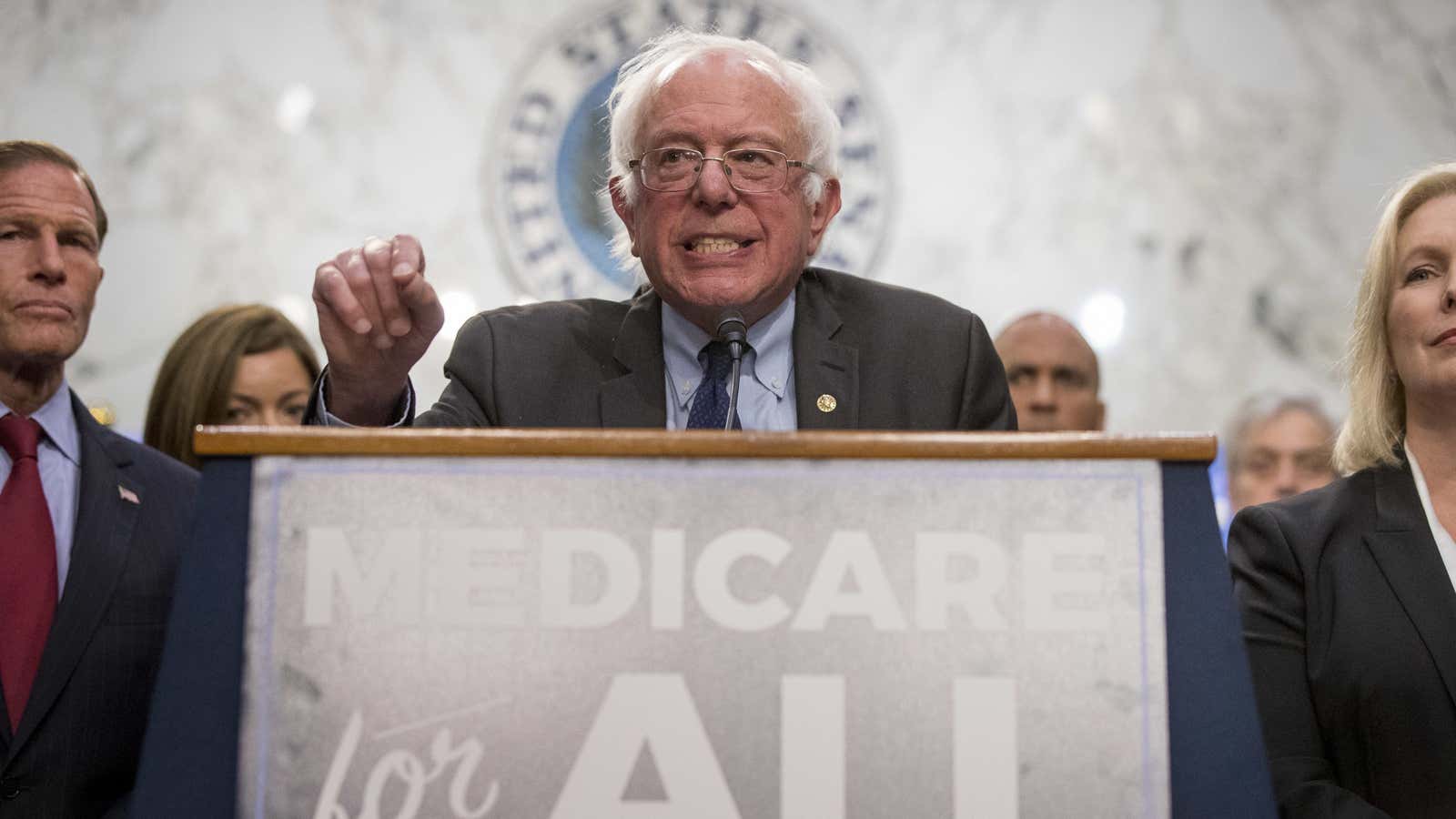Senator Bernie Sanders introduced his Medicare for All Act of 2017 on Wednesday with the support of a slew of prominent Democratic senators. It’s a bold move: While progressives have long rallied around single-payer healthcare, many Americans tend to greet the prospect of health-care overhauls with trepidation. But Sanders thinks he has an answer to these fears.
Sanders’ plan would abolish most private health insurance and pool all Americans into a single Medicare-for-All plan. This would happen over the course of four years, starting by expanding Medicare to all children and people over 55 in the first year, and gradually lowering the Medicare eligibility age until the entire country is covered. The plan would retool Medicare’s benefits to make it one of the most generous health-care systems in the world, covering most services at no individual cost.
That all sounds great in theory. But many Americans get spooked when politicians tinker with their health care—precisely because the stakes are so high. The Clintons learned that firsthand during their first reform push in the 1990s. “[W]e were facing the reality of not just strong, powerful forces,” Hillary Clinton recently told Vox, “but people’s own fears as well as their appreciation for what they already had.”
Health-care reform butts up against a deep psychological resistance known as the endowment effect. People’s fear of losing what they already have tends to outweigh their desire to gain just something that is just as good (or even better). This was at the root of the uproar over Obamacare’s insurance plan cancellations in 2013. People were furious that their skimpy insurance plans were being canceled and replaced with something different, even though the new plans would be better. It’s simply hardwired into our brains to resist change to something we already have and like—particularly to something as vital as our health insurance.
Yet Sanders thinks he’s found a way around these fears. For one thing, his bill is purposely designed to enact single-payer through an already-familiar program. People already know and like Medicare. Berniecare would simply expand it to everyone.
More importantly, Sanders wants to emphasize that Medicare-for-All wouldn’t take anything away from you—it would only give you more. Under his program, Sanders recently said, “You go to the same doctor. You go to any damn doctor you want to go to. What’s going to change is the wording on the card that you have. It will no longer be United Health Insurance or Blue Cross Blue Shield. It’ll be Medicare-for-all.”
Another way to put it is that Medicare-for-All would function as truly universal insurance that is good anywhere, for any health-care service you’d like. As Sanders says, his bill would change the name on your insurance card, but nothing else about your treatment regimen. If you already have good coverage, its practical effect would be to get rid of the things people don’t like about their insurance: co-pays, deductibles, and limited provider networks.
That’s a lot different from how Obamacare’s transition operated. Obamacare moved us closer to universal coverage largely through private insurance plans that each had their own unique networks and benefit structures. So if you had to change plans under Obamacare, there was a real chance that it did mean disruptions to the doctors you could see and the benefits you receive.
Thanks to its reliance on private insurers, Obamacare’s transition in 2013 really did threaten to get between you and your doctor. In Sanders’s single-payer system, that’s not an issue, because Medicare would be the only game in town.
Of course, that may not be enough to allay fears about Medicare-for-All. People may get nervous about extending the reach of government. They may revolt against Berniecare’s to-be-determined taxes. They could get spooked by the prospect of longer waiting lines from higher demand to see doctors. After all, in a recent survey by the non-partisan Kaiser Family Foundation, 55% of people initially supported a single-payer system. But this support sunk by more than a third when confronted with these types of downsides.
Those concerns will weigh on the minds of the centrist Democrats who will ultimately hold the deciding votes on any future healthcare reform. But even if Medicare-for-All never becomes law, Sanders’s bill still widens the playing field of what is possible. By making an ultra-ambitious opening bid, Sanders has provided political cover for more centrist Democrats to triangulate toward Medicare-for-All’s still-very-progressive cousins. These alternatives include Sen. Brian Schatz’s plan for a Medicaid buy-in, Sen. Chris Murphy’s plan for a Medicare buy-in, or a robust public option.
Sanders may or may not have found a way to soothe America’s fear of health-care upheaval. But by making universal health care a moral imperative, he has increased the odds that progressives will take bigger strides toward healthcare for all.
